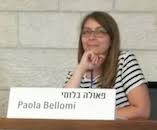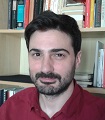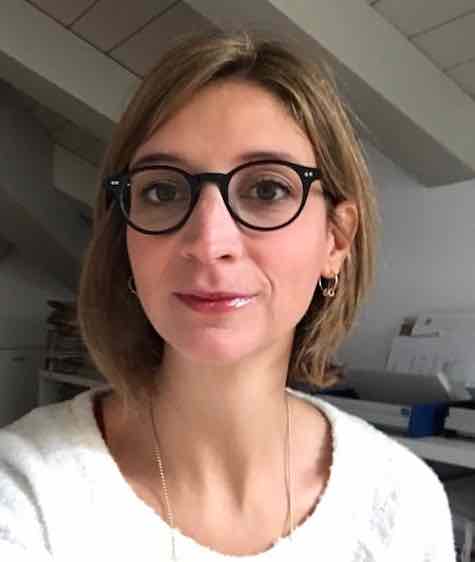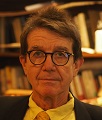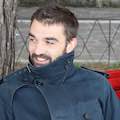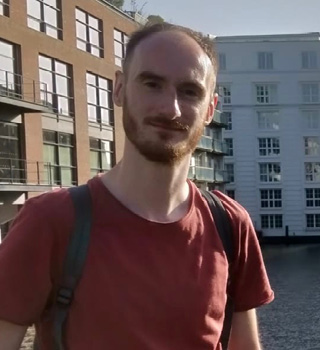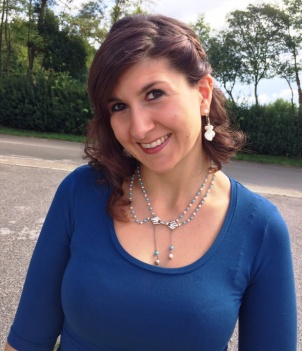Studiare
In questa sezione è possibile reperire le informazioni riguardanti l'organizzazione pratica del corso, lo svolgimento delle attività didattiche, le opportunità formative e i contatti utili durante tutto il percorso di studi, fino al conseguimento del titolo finale.
Calendario accademico
Il calendario accademico riporta le scadenze, gli adempimenti e i periodi rilevanti per la componente studentesca, personale docente e personale dell'Università. Sono inoltre indicate le festività e le chiusure ufficiali dell'Ateneo.
L’anno accademico inizia il 1° ottobre e termina il 30 settembre dell'anno successivo.
Calendario didattico
Il calendario didattico indica i periodi di svolgimento delle attività formative, di sessioni d'esami, di laurea e di chiusura per le festività.
| Periodo | Dal | Al |
|---|---|---|
| I semestre | 2-ott-2017 | 20-gen-2018 |
| ANNUALE | 2-ott-2017 | 9-giu-2018 |
| II semestre | 26-feb-2018 | 9-giu-2018 |
| Sessione | Dal | Al |
|---|---|---|
| ESAMI LINGUE - sessione invernale | 22-gen-2018 | 24-feb-2018 |
| ESAMI LINGUE - sessione estiva | 11-giu-2018 | 28-lug-2018 |
| ESAMI LINGUE - sessione autunnale | 27-ago-2018 | 22-set-2018 |
| Sessione | Dal | Al |
|---|---|---|
| LAUREE LINGUE - sessione autunnale a.a. 2016/2017 | 18-dic-2017 | 21-dic-2017 |
| LAUREE LINGUE - sessione invernale a.a. 2016/2017 | 23-mar-2018 | 29-mar-2018 |
| LAUREE LINGUE - sessione estiva | 16-lug-2018 | 21-lug-2018 |
| LAUREE LINGUE - sessione autunnale | 12-nov-2018 | 17-nov-2018 |
| LAUREE LINGUE - sessione invernale | 12-apr-2019 | 18-apr-2019 |
| Periodo | Dal | Al |
|---|---|---|
| Festa dell'Immacolata | 8-dic-2017 | 8-dic-2017 |
| Vacanze di Natale | 22-dic-2017 | 7-gen-2018 |
| Vacanze di Pasqua | 30-mar-2018 | 3-apr-2018 |
| Festa della liberazione | 25-apr-2018 | 25-apr-2018 |
| Festa del lavoro | 1-mag-2018 | 1-mag-2018 |
| Festa del Santo Patrono | 21-mag-2018 | 21-mag-2018 |
| Festa della Repubblica | 2-giu-2018 | 2-giu-2018 |
| Vacanze Estive | 13-ago-2018 | 18-ago-2018 |
| Descrizione | Periodo | Dal | Al |
|---|---|---|---|
| ANNUALE | ANNUALE | 2-ott-2017 | 9-giu-2018 |
Calendario esami
Gli appelli d'esame sono gestiti dalla Unità Operativa Segreteria Corsi di Studio Lingue e letterature straniere.
Per consultazione e iscrizione agli appelli d'esame visita il sistema ESSE3.
Per problemi inerenti allo smarrimento della password di accesso ai servizi on-line si prega di rivolgersi al supporto informatico della Scuola o al servizio recupero credenziali
Per dubbi o domande leggi le risposte alle domande più frequenti F.A.Q. Iscrizione Esami
Docenti
 valentina.adami@univr.it
valentina.adami@univr.it
 paola.bellomi@univr.it
paola.bellomi@univr.it
 daniele.beltrame@univr.it
daniele.beltrame@univr.it
 riccardo.cella@univr.it
riccardo.cella@univr.it
 elisa.dallarosa@univr.it
elisa.dallarosa@univr.it
 sara.dattoma@univr.it
sara.dattoma@univr.it
 federico.febbroni@univr.it
federico.febbroni@univr.it
 veronica.gobbato@univr.it
veronica.gobbato@univr.it
Hernandez Arocha Hector Eutimio
 hector.hernandez@univr.it
hector.hernandez@univr.it
 gianpaolo.lazzer@univr.it
gianpaolo.lazzer@univr.it
 stefania.montemezzo@univr.it
stefania.montemezzo@univr.it
 anna.morbiato@unive.it
anna.morbiato@unive.it
 chunye.niu@univr.it
chunye.niu@univr.it
 sara.paolini@univr.it
sara.paolini@univr.it
 valentina.savietto@univr.it
valentina.savietto@univr.it
 fabioantonio.scrignoli@univr.it
fabioantonio.scrignoli@univr.it
 alice.valdesalici@univr.it
alice.valdesalici@univr.it
Piano Didattico
Il piano didattico è l'elenco degli insegnamenti e delle altre attività formative che devono essere sostenute nel corso della propria carriera universitaria.
Selezionare il piano didattico in base all'anno accademico di iscrizione.
1° Anno
| Insegnamenti | Crediti | TAF | SSD |
|---|
Letteratura e cultura tedesca 1
Letteratura e cultura tedesca 1
2° Anno Attivato nell'A.A. 2018/2019
| Insegnamenti | Crediti | TAF | SSD |
|---|
Deutsche Literatur und Kultur 2
English literature and culture 2
Literatura y cultura española 2
Deutsche Literatur und Kultur 2
English literature and culture 2
Literatura y cultura española 2
Geografia delle comunicazioni e del commercio internazionale
Letteratura e cultura italiana
Storia economica contemporanea
Teoria e tecnica della comunicazione
3° Anno Attivato nell'A.A. 2019/2020
| Insegnamenti | Crediti | TAF | SSD |
|---|
Diritto pubblico comparato ed europeo
Principi di marketing internazionale
| Insegnamenti | Crediti | TAF | SSD |
|---|
Letteratura e cultura tedesca 1
Letteratura e cultura tedesca 1
| Insegnamenti | Crediti | TAF | SSD |
|---|
Deutsche Literatur und Kultur 2
English literature and culture 2
Literatura y cultura española 2
Deutsche Literatur und Kultur 2
English literature and culture 2
Literatura y cultura española 2
Geografia delle comunicazioni e del commercio internazionale
Letteratura e cultura italiana
Storia economica contemporanea
Teoria e tecnica della comunicazione
| Insegnamenti | Crediti | TAF | SSD |
|---|
Diritto pubblico comparato ed europeo
Principi di marketing internazionale
| Insegnamenti | Crediti | TAF | SSD |
|---|
Legenda | Tipo Attività Formativa (TAF)
TAF (Tipologia Attività Formativa) Tutti gli insegnamenti e le attività sono classificate in diversi tipi di attività formativa, indicati da una lettera.
Letteratura e cultura russa 1 (2017/2018)
Codice insegnamento
4S002905
Docente
Coordinatore
Crediti
6
Lingua di erogazione
Italiano
Settore Scientifico Disciplinare (SSD)
L-LIN/21 - SLAVISTICA
Periodo
I semestre dal 2-ott-2017 al 20-gen-2018.
Obiettivi formativi
Al completamento delle lezioni lo studente dovrà:
1) Conoscere i momenti più importanti e le peculiarità principali della storia russa e gli elementi essenziali della cultura russa del XIX secolo;
2) Saper applicare le conoscenze acquisite nell’analisi delle opere affrontate durante il corso, avvalendosi della bibliografia critica proposta;
3) Essere in grado di sviluppare giudizi automi sui temi principali del corso di esporli in modo coerente e corretto.
Programma
1) Breve percorso nella storia russa
2) Letteratura e cultura russa del XIX secolo
Opere:
• A. Puškin, La donna di picche
• N. Gogol’, Il Revisore
• F. Dostoevskij, Delitto e Castigo
• L. Tolstoj, I racconti di Sebastopoli
• A. Čechov, Il grasso e il magro
Critica:
• V. Strada, EuroRussia. Letteratura e cultura da Pietro il Grande alla rivoluzione (selezione di pagine), Bari, Laterza, 2005.
• E. Lo Gatto, Il mito di Pietroburgo. Storia, leggenda, poesia, Milano, Feltrinelli, 1960 (ultima edizione 2013) (selezione di pagine).
• • V. Nabokov, Lectures on Russian literature, edited and with an introduction by Fredson Bowers, Orlando [etc.] : Harvest ; Harcourt ; Bruccoli Clark Layman, 1981, Ch. FYODOR DOSTOEVSKI (1821-1881), pp. 67-90.
• Ju. Mann, La poetica di Gogol’, Roma, Lithos, 2014 (Capitolo quinto. Il revisore. La situazione generale e l’intreccio miraggio, pp. 179-272).
Inquadramento:
— M. Colucci e R. Picchio (a cura di), Storia della civiltà letteraria russa, Torino, UTET 1997 (le parti relative agli autori e ai periodi trattati)
— P. Buskovitch, Breve storia della Russia. Dalle origini a Putin, Torino, Einaudi, 2013
Modalità d’insegnamento: lezioni frontali; e-learning, lettura, traduzione e commento di testi letterari.
Altri materiali saranno caricati nella pagina e-learning del corso.
| Autore | Titolo | Casa editrice | Anno | ISBN | Note |
|---|---|---|---|---|---|
| P. Bushkovitch | Breve storia della Russia. Dalle origini a Putin | Einaudi | 2013 | ||
| V. Strada | EuroRussia. Letteratura e cultura da Pietro il Grande alla rivoluzione | Laterza | 2005 | Solo una selezione di pagine | |
| E. Lo Gatto | Il mito di Pietroburgo. Storia, leggenda, poesia | Feltrinelli | 2013 | Prima edizione: Milano 1960. Solo una Selezione di pagine | |
| Ju. Mann | La poetica di Gogol' | Lithos | 2014 | Solo il capitolo quinto: Il revisore. La situazione generale e l’intreccio miraggio, pp. 179-272. | |
| M. Colucci e R. Picchio (a cura di) | Storia della civiltà letteraria russa | UTET | 1997 | Le parti relative agli autori e ai periodi trattati. |
Modalità d'esame
Prova in itinere (esame scritto sulla storia russa).
Prova finale: esame orale.
Nelle prove le domande rispecchieranno i concetti e i temi fondamentali del corso.
All’esame, uno degli aspetti di verifica delle conoscenze sarà il commento dei testi letterari.
La valutazione seguirà i seguenti criteri:
- correttezza sostanziale e completezza delle risposte sul piano dei contenuti;
- capacità di analisi;
- chiarezza espositiva, capacità argomentativa e conoscenza del linguaggio specifico della materia.
Propedeuticità:
Per sostenere l’esame lo studente dovrà aver superato i saperi minimi.
Tipologia di Attività formativa D e F
Per scoprire tutte le attività didattiche accreditate dal Collegio didattico clicca qui
Prospettive
Avvisi degli insegnamenti e del corso di studio
Per la comunità studentesca
Se sei già iscritta/o a un corso di studio, puoi consultare tutti gli avvisi relativi al tuo corso di studi nella tua area riservata MyUnivr.
In questo portale potrai visualizzare informazioni, risorse e servizi utili che riguardano la tua carriera universitaria (libretto online, gestione della carriera Esse3, corsi e-learning, email istituzionale, modulistica di segreteria, procedure amministrative, ecc.).
Entra in MyUnivr con le tue credenziali GIA: solo così potrai ricevere notifica di tutti gli avvisi dei tuoi docenti e della tua segreteria via mail e a breve anche tramite l'app Univr.
Area riservata studenti
Gestione carriere
Assegnazione tutore
Attività accreditate D/F
Calendario didattico dettagliato
Cambio lingua curriculare
Competenze informatiche
Competenze linguistiche (prima e seconda lingua)
Competenze linguistiche in triennale (terza lingua CFU F)
Compilazione del piano didattico
Corso di Lingua portoghese
Erasmus+ e altre esperienze all'estero
Esercitazioni Linguistiche CLA
Presentazione dei corsi di studio e Open day
Prova finale
La prova finale, a cui vengono attribuiti 6 CFU consiste nella preparazione e discussione di un elaborato scritto su materia di uno degli insegnamenti in cui siano stati acquisiti almeno 6 CFU.
La discussione dell'elaborato scritto avviene in presenza di una Commissione Istruttoria composta da due docenti dell'Ateneo che si riunisce nei giorni precedenti la proclamazione e che propone alla Commissione di Laurea (composta da almeno tre docenti) una valutazione. Alla prova finale potranno essere attribuiti non più di 5 punti su 110. L'attribuzione della lode avviene o su proposta del relatore, se l'elaborato è ottimo e la media dei voti conseguiti negli esami dallo Studente raggiunge almeno 110 punti, o in maniera automatica se la media raggiunge almeno 113 punti.
Il voto di laurea è formato da:
a) la media aritmetica dei voti conseguiti negli esami, rapportata a 110,
b) la valutazione dell'elaborato finale,
c) punti supplementari di incentivazione:
- un massimo di 2 punti per le lodi (1 punto per due lodi, 2 punti per più lodi).
- 2 punti per la partecipazione al Programma Erasmus o assimilato, a condizione che lo studente: abbia acquisito almeno 12 CFU per un semestre di mobilità nel corso del ciclo di studi (24 CFU per due semestri di mobilità) e consegua il titolo finale entro la durata normale del corso di studi.
- 1 punto per la partecipazione al Programma Erasmus o assimilato, a condizione che lo studente: abbia acquisito almeno 12 CFU per un semestre di mobilità nel corso del ciclo di studi (24 CFU per due semestri di mobilità) e consegua il titolo finale anche oltre la durata normale del corso di studi.
- Lo studente vincitore del bando del Ministero dell’Università per assistente di lingua italiana all’estero o di borsa Comenius presso scuole di 1° e 2° grado dell’Unione Europea otterrà un punteggio supplementare, che sarà aggiunto alla media finale del voto di laurea: 1 punto, per una esperienza di assistentato fino a 6 mesi; 2 punti, per una esperienza di assistentato superiore a 6 mesi.
Non possono essere attribuiti punti di incentivazione per qualsiasi esperienza all’estero svolta dallo studente su iniziativa privata, anche se riconosciuta come equipollente dal Dipartimento/Collegio Didattico.
- 2 punti per la conclusione degli studi in corso (solo per gli studenti di prima immatricolazione, senza il riconoscimento della carriera pregressa o sospensione di carriera).
Adempimenti amministrativi, scadenze domanda di laurea, calendari delle discussioni elaborato finale e proclamazioni di laurea al seguente link Sessioni di laurea
Elenco delle proposte di tesi e stage
| Stage | Area di ricerca |
|---|---|
| PROGETTO MAMBRINO Stage per bibliografia | Argomenti vari |
Saperi minimi
Stage e tirocini
Nel piano didattico della laurea triennale in Lingue per il turismo e il commercio internazionale (L12) è previsto un periodo di stage obbligatorio (CFU 6) in organizzazioni imprenditoriali.
Le attività di stage sono finalizzate a far acquisire allo studente una conoscenza diretta in settori di particolare interesse per l’inserimento nel mondo del lavoro e per l’acquisizione di abilità professionali specifiche.
Le attività di stage sono svolte sotto la diretta responsabilità di un singolo docente presso studi professionali, enti della pubblica amministrazione, aziende accreditate dall’Ateneo veronese.
I crediti maturati in seguito ad attività di stage saranno attribuiti secondo quanto disposto nel dettaglio dal “Regolamento d’Ateneo per il riconoscimento dei crediti maturati negli stage universitari” vigente.
- Tutte le informazioni in merito agli stage per futuri studenti sono disponibili alla pagina Stage e tirocini.
- Tutte le informazioni in merito agli stage per studenti iscritti sono pubblicate in MyUnivr - come fare per - stage e tirocini.
- Tutte le informazioni in merito agli stage per le aziende sono disponili alla pagina Stage e tirocini per azienze.
Ulteriori informazioni al seguente link https://www.univr.it/it/i-nostri-servizi/gestione-carriere-studenti-lingue-e-letterature-straniere/stage-e-tirocini-lingue-e-letterature-straniere


 +39 045802 8409
+39 045802 8409
